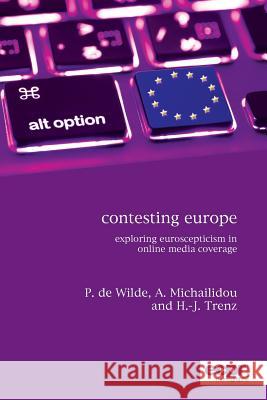Contesting Europe: Exploring Euroscepticism in Online Media Coverage » książka
Contesting Europe: Exploring Euroscepticism in Online Media Coverage
ISBN-13: 9781907301513 / Angielski / Miękka / 2013 / 292 str.
Investigates the way politicians and citizens evaluated the European Union and the process of European integration in public debates during the 2009 European Parliament elections. The authors present detailed, rigorous analysis of citizens' online response to news stories, and reveal new evidence about the dynamic nature of online contestation of Europe and the degree of convergence towards Euroscepticism. Such convergence provides new challenges for democratic representation in the EU, and insight into the public basis for a legitimate European Union.
This book investigates the way politicians and citizens evaluated the European Union and the process of European integration in public debates during the 2009 European Parliament elections. It presents detailed and rigorous content analysis of online media where citizens directly and voluntarily responded to news stories posted by journalists. New evidence is presented about the dynamic nature of contestation about Europe on the internet and the degree of convergence towards Euroscepticism across EU member states. Such convergence poses new challenges for democratic representation in the EU and provides insight into the public basis for a legitimate European Union.In this book European contestation has come of age.Pieter de Wilde, Asimina Michailidou and Hans-Jörg Trenzdeliver a tour de force in mapping the multifaceted debate aboutEurope among parties and citizens in twelve countries.Informed by rich media data they convincingly argue thatopposition as well as support for Europe comes in differentshades: it can be partial, conditional, or temporal.This is a wonderfully nuanced book for scholars, studentsand policy makers concerned about Europes future.Liesbet Hooghe, W. R. Kenan, Jr.Distinguished Professor, University of North Carolina and Chair in Multilevel Governance, VU University of Amsterdam











